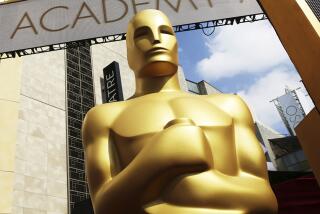Not All Open Arms for Ceremony
- Share via
Indifferent to hoopla and buzz, the sidewalks around the intersection of Hollywood Boulevard and Highland Avenue came to life slowly Tuesday. Scents of coffee, mustard and doughnuts floated out into the balmy winter morning. Beneath a mammoth, beaming Britney Spears billboard, a smattering of tourists in shorts and cameras walked around workers mopping the Walk of Fame. To the sounds of Latin music and drive-time radio coming from souvenir shops, purple-haired, black-clad business people passed schoolchildren, the odd derelict or midnight cowboy.
Only a team from Japanese public television taping the entrance to the new Kodak Theatre testified to the impending shift of the Academy Awards to the neighborhood after years of being held at the Dorothy Chandler Pavilion and the Shrine Auditorium.
But behind the quiet street scene, there were plenty of opinions about the effect of the March 24 Oscar ceremonies--and they were mixed.
“It’s going to hurt us very much,” said Dody Urban, chief supervisor of Starbucks in the new Hollywood & Highland complex, in between serving a long line of customers. Like most shops in the adjacent block, she expects hers will be closed by authorities on Oscar Sunday for security reasons.
On the other hand, Glen LaCour, who runs an international student hostel next door, said he’s already rented every room to the Academy of Motion Picture Arts and Sciences to allow security police access to the roof. Residents will be forced to relocate for at least one night.
Finnish acting student Lissa Manner Koski, 21, a resident of the hostel, said she had been looking forward to watching the movie stars arrive from the office window. Now, she said, she’ll just have to watch it on TV.
“My business sense recognizes the Oscars are good for Hollywood, good for movies, good for the whole industry,” said Ted Nelson, owner of Hollywood Plaques and a wholesaler of trophies and awards to about 50 businesses on Hollywood Boulevard. But for the local shopkeepers, moving the awards to Hollywood “won’t make a bit of difference,” he said.
During winter, shopkeepers usually see a 30% drop from their summer peak. This year, however, they’re down 70% due to tourist fallout after Sept. 11, Nelson said. Surviving on the sales of T-shirts, postcards, ashtrays and shot glasses--anything, in short, with the word “Hollywood” on it--the souvenir shops that have stayed afloat are those nearest the Chinese Theater, Nelson said.
The businesses to benefit the most will probably be the nearby hotels hosting post-Oscar parties, said Hollywood Chamber of Commerce President Leron Gubler. “With the huge reporter pool, all the restaurants should definitely benefit as well,” he added.
Already, the fact that the Oscars would be held in the Hollywood & Highland complex has bestowed “instant credibility” on the giant building, he said. Despite the project’s financial problems (the developer recently reduced the value by $217 million), Gubler said, “Seeing Hollywood on the worldwide screen will help us with our revitalization.... You have to look at the big picture.”


